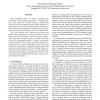Free Online Productivity Tools
i2Speak
i2Symbol
i2OCR
iTex2Img
iWeb2Print
iWeb2Shot
i2Type
iPdf2Split
iPdf2Merge
i2Bopomofo
i2Arabic
i2Style
i2Image
i2PDF
iLatex2Rtf
Sci2ools
109
click to vote
RTSS
2008
IEEE
2008
IEEE
Merging State and Preserving Timing Anomalies in Pipelines of High-End Processors
Many embedded systems are subject to temporal constraints that require advance guarantees on meeting deadlines. Such systems rely on static analysis to safely bound worst-case execution (WCET) bounds of tasks. Designers of these systems are forced to avoid state-of-the-art processors due to their inherent architectural complexity (such as out-oforder instruction scheduling) that results in non-determinism. This work addresses this problem by providing novel pipeline analysis techniques for characterizing the worst-case behavior of real-time systems on modern processor architectures. We introduce methods to capture (“snapshot”) pipeline state and to subsequently perform a “merge” of previously captured snapshots. We prove that our pipeline analysis correctly preserves worst-case timing behavior on out-of-order (OOO) processor pipelines. We further specifically show that anomalous pipeline effects, effectively dilating timing, are preserved by our method. To the best of our kno...
| Added | 01 Jun 2010 |
| Updated | 01 Jun 2010 |
| Type | Conference |
| Year | 2008 |
| Where | RTSS |
| Authors | Sibin Mohan, Frank Mueller |
Comments (0)

